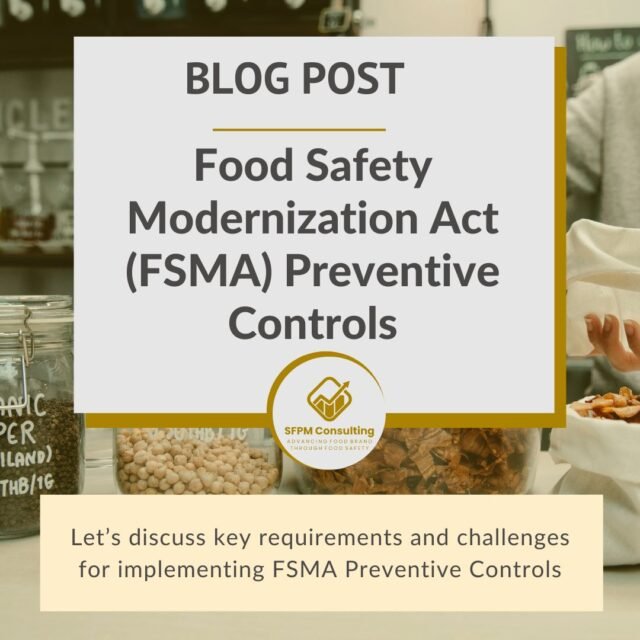Preventive controls are a crucial aspect of ensuring food safety in producing and processing food products. These controls are designed to prevent hazards that could potentially cause harm to consumers, such as biological, chemical, and physical contaminants. By implementing preventive controls, food manufacturers can identify potential risks in their production processes and take steps to prevent them from occurring. This proactive approach to food safety is essential for protecting consumers and maintaining the integrity of the food supply chain.
Preventive controls are a key component of the Food Safety Modernization Act (FSMA), signed into law in 2011. The FSMA represents a significant shift in how food safety is regulated in the United States, moving from a reactive approach to a more preventive one. Under the FSMA, food manufacturers must implement preventive controls to identify and address potential hazards in their production processes. This includes conducting hazard analysis, implementing controls to prevent hazards, monitoring the effectiveness of these controls, and taking corrective actions when necessary. By taking a proactive approach to food safety, manufacturers can reduce the risk of foodborne illness and ensure the safety of their products.
What are FSMA Preventive Controls?
FSMA Preventive controls play a critical role in ensuring the safety of the food supply chain. Under the FSMA regulations, food manufacturers must conduct hazard analysis to identify potential hazards in their production processes, implement controls to prevent these hazards, monitor the effectiveness of these controls, and take corrective actions when necessary.
In addition to the FSMA, other regulatory bodies, such as the Food and Drug Administration (FDA) and the United States Department of Agriculture (USDA), also require food safety controls in food production. These regulations are designed to ensure that food manufacturers take a proactive approach to food safety, identifying and addressing potential hazards before they can cause harm to consumers. By complying with these regulatory requirements, food manufacturers can demonstrate their commitment to ensuring the safety of their products.
Under the FSMA regulations, there are 4 types of preventive controls:
- Process Preventive Controls
- Sanitation Preventive Controls
- Supply Chain Preventive Controls
- Allergen Preventive Controls.
We will not be discussing these preventive controls in detail, but it is important to be reminded that the hazard assessments are based on the HACCP principle with preventive control in mind.
Additionally, the manufacturer must designate a PCQI or Preventive Control Qualified Individuals who can demonstrate knowledge through experience or formal curriculum for the FSMA requirements to oversee the implementation of Preventive Controls (PCs). Records for PCs must be verified within 7 business days.
Benefits of Preventive Controls
I personally am in favour of the additional requirements as they mandate food manufacturers to have a proper system in place to prevent contamination and the risk of costly recalls. It also build awareness for appropriate operational and quality management systems.
Challenges and Considerations for Implementing Preventive Controls
I see numerous challenges when implementing FSMA preventive controls.
First, overlapping of food safety regulatory requirements and assessment formats. For a Canadian company selling to the US with GFSI certification, it likely means they will need to comply with the Canadian SFCR PCP plan, US FSMA PCP plan and HACCP plan. Managing these plans takes time, especially when updating the documents; the personnel must know what and how to update them consistently throughout the various food safety plans.
Secondly, questioning the actual competence of the trained PCQI. Many trained PCQI attended 20 hours of training content, which is great for improving their knowledge. However, the actual implementation, program development, and implementation applications cannot be fully delivered or monitored throughout the course. Many trained staff are unsure of their responsibilities after the training.
Third, cost and resource challenges for small and medium-sized businesses with limited resources. Balancing costs for actual food safety and verification activities can be a challenge.
Staff Training to Implement US FSMA Preventive Control Plan Requirements
By now, you would have understood the importance of the FSMA PCP plan in your food business. It is important to have the right person who knows what they are doing and how to manage risk (regulatory and food safety) when managing your Preventive Control Plan.
Training beyond just the FSMA Preventive Control curriculum is important to ensure you can fully translate the training materials and content into actual implementation. I have just coached a person who has taken the training for more than 5 years, you would imagine they have practiced well. 5 years is a long time but, the person is still confused about risk management.
Having one-to-one guidance, they are able to develop proper food safety hazard evaluations and apply these to their FSMA preventive control plan. My one-to-one guidance services are premium services that we offer to grow our client’s team. If you think this is the right approach for you, we are only taking limited clients on a quarterly basis.

